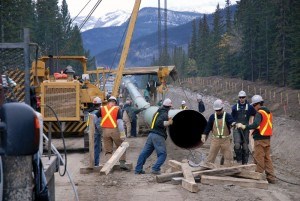
The debate about oil pipelines is one of the most divisive issues plaguing the country today, yet when it comes to the cold hard facts it seems people are missing some very important information.
The issue reared its ugly head again this week after the National Energy Board (NEB) conditionally approved Kinder Morgan’s Trans Mountain pipeline that runs through Jasper National Park.
The conditional approval includes 157 conditions, including 49 environmental requirements before the pipeline can be constructed. The federal government now has until December to decide whether to approve the pipeline or not.
If approved, the proposed expansion would include building approximately 987 km of new pipeline and reactivating 193 kms of existing pipeline–the majority of which was already built through Jasper National Park in 2008.
Once completed, the twinned pipeline would allow 890,000 barrels of oil to pass through the park a day from Strathcona County, near Edmonton, to Burnaby, B.C.–nearly three times the amount that travels through JNP today.
Critics of oil pipelines claim it will increase pollution that causes global warming and put communities along its route at undue risk if the pipeline were to ever rupture.
There’s no denying that extracting oil from Alberta’s oilsands requires more energy and creates more greenhouse gas emissions than traditional forms of oil, but it’s important to put those facts in perspective.
According to the province, the oil sands account for 23 per cent of the province’s overall greenhouse gas emissions, representing eight per cent of the country’s overall emissions.
Putting that into perspective this represents less than 0.15 per cent of global emissions. That’s a small cry from the 13 per cent of global emissions caused by the transportation sector every year, according to a 2012 report by the United Nations Environment Programme.
While emissions from the energy sector represents 29 per cent of global emissions, Alberta’s oil sands are only a small part of the problem.
What’s more is that the NEB found that the benefits of Kinder Morgan’s project would outweigh the residual burdens for several reasons, including the fact that almost 90 per cent of the pipeline route for the project parallels existing pipeline, which will reduce the need to disturb other environmentally sensitive areas and minimize the potential impacts caused by construction.
Taking it one step further, according to a 2015 report by the Fraser Institute transporting oil by rail is 4.5 times more likely to experience a spill compared to pipelines.
“At present, resistance to pipeline transport is sending oil to market by modes of transport that pose higher risks of spills and personal injuries, such as rail and road transport,” the report concludes.
In Jasper we only need to remember the 12 CN grain cars that spilled their contents into the Athabasca River last December to understand why moving oil by rail is a risky business.
Jasper is a main artery for Canada's rail system, so either way oil will have to make its way through the park, it’s just a question of what’s the safer option.
The reality is that in 2016 oil is still a necessary evil and pipelines aren't the enemy; in fact pipelines are the logical and prudent solution.
